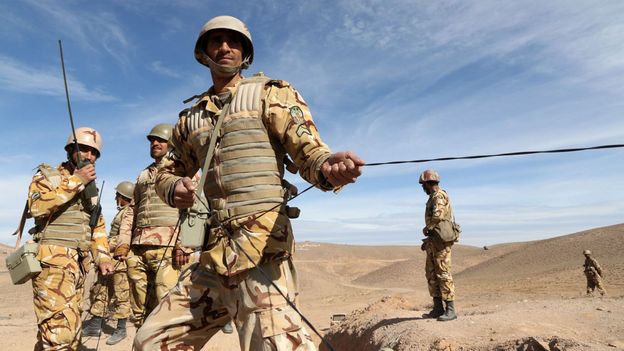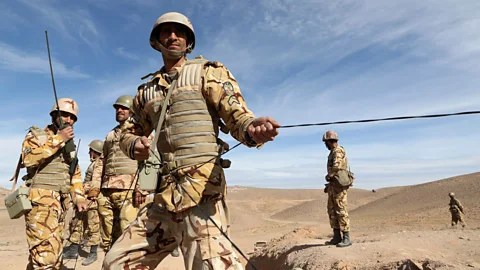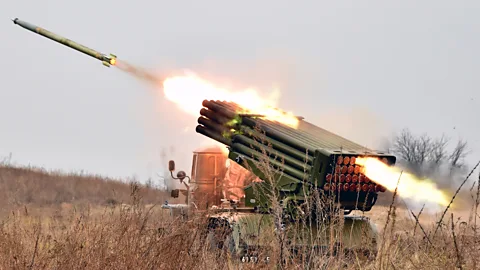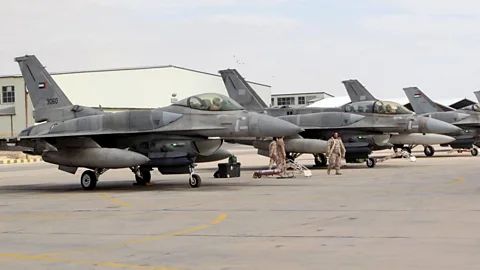The high cost of avoiding the draft

 Getty Images
Getty ImagesGlobal tensions are leading some countries to reconsider conscription. But while it can be a career boost for some, for others it’s to be avoided at all costs.
Across Europe, tens of thousands of young men – and some women – could soon be served with draft papers and required to serve in their national militaries.
Conscription was phased out by most European countries after the Cold War, but amid growing geopolitical uncertainty following Russia’s annexing of Crimea, a number of countries are rethinking their civil defence capacity.
Meanwhile, throughout the continent, domestic terror attacks and the rise of antagonist right wing politics has sparked fresh conversations about issues of national cohesion and identity. Germany, France, Poland and Sweden are among the countries where there is a debate about bringing back mandatory national service in some form, be it military or civil. Ukraine and Lithuania have already passed laws to formalise the draft, and Norway, which like Finland has maintained conscription, has now made it compulsory for women as well as men.
 Getty Images
Getty Images“Given the resurgence of Russia on the borders of Europe, a lot of countries are re-thinking their strategies on conscription and national defence,” says Elizabeth Quintana, director of military science at the Royal United Services Institute (RUSI), a think-tank.
This scenario in Europe has come about because of perceived threats from Russia, but conscription is in fashion for other reasons too, says Daniel Keohane, a senior researcher at the Center for Security Studies at Swiss university ETH Zurich.
In the Middle East, the United Arab Emirates and Kuwait have both in the past year begun mandatory military service for their young men. With only a small population, the UAE wants to bolster its defences amid growing regional uncertainty in countries such as Yemen and Syria. But conscription is also seen to promote a stronger sense of nationhood for the young country.
As in most countries, those in the UAE can be excused from military service if they have certain medical conditions, like diabetes or epilepsy, or even flat feet, or you are the only male provider for their family.
 Getty Images
Getty ImagesBut there can be an upside to service. UAE law requires that Emiratis who are employed at the time of their call-up must have their position held for them and then should be prioritised for promotion when they return. For recruits, that could help soften the blow of having to suspend career ambitions for the sake of the country.
Doing military service can in some cases be a career boost, says Victoria Bethlehem, senior vice president for global talent acquisition, planning and development at recruitment giant Adecco Group.
“Candidates learn useful skills and gain valuable experiences during national service that they can take with them into their careers and working lives,” she says.
This was the attitude adopted by Londoner David Hubbard, who could have used his dual nationality and study plans to get out of doing Finnish national service.
He decided instead to grasp the opportunity because he thought it would be “a talking point” and help him stand out when he applies for jobs after university.
“Overall, it’s been an awesome experience,” the 19-year-old says. “It was tough to start with. I barely spoke any Finnish when I arrived and I didn’t always know what was going on, but it has got easier and I’ve certainly learned how to cope with tough situations better.”
Conscription in other countries is less pleasant and many young men – and their families – go to extreme lengths in order to dodge the draft.
Young men in Russia are required to serve 12 months in the army for their national service. There are no official statistics for how many Russian men duck this duty, but it is believed as many as half avoid it through paying bribes or by staying on at university to pursue doctoral or other further studies.
“Corruption is widespread in Russia and paying someone to get out of military service is very common and quite socially accepted,” says an analyst at the European Parliamentary Research Service, who asked not to be named.
 Getty Images
Getty ImagesIn Turkey, all young men, apart from those exempted on health grounds, or who are sole earners for their families, must do military service.
But, money talks for those who’d rather not serve. In addition to the thriving business for doctors who are willing to write fake medical certificates, the government sometimes allows men to pay their way out, via temporary amnesty windows.
Currently, for Turks who have been living, working or studying outside of the country for more than three years, there is an option to pay 1,000 euros ($1,096) for a full exemption. For those inside the country, when there is an option to pay, it is significantly higher – up to 18,000 Turkish lira ($5,813), enough to land someone in significant debt for years to come.
Fail to report for military service when required and you will be summonsed to court and fined 100 lira ($32), with the penalty doubling with each appearance. There is no exemption for conscientious objectors.
Many Iranians also avoid conscription by living outside the country, says Potkin Azarmehr, a UK-based Iranian commentator and regime critic who left Iran as a child in 1976.
 Getty Images
Getty ImagesOthers pay their way out, though the amount – and even the option – to pay changes regularly and clear information is hard to come by.
“It’s quite classist. Those with money can afford to go out and come back and pay, those who can’t must stay and do their service,” says Potkin.
Others, he says, take a more novel approach. “I know of one guy who wanted to get out of it so badly that he took tablets to increase his appetite in order to put on weight. At the time being overweight was a way to be exempted. It worked, but he has been unable to lose the weight since.
He adds: “Another person I know declared himself illiterate. Today he’s a successful businessman, but whenever his papers are checked it comes up that he didn’t do his service because of being illiterate, and it’s quite embarrassing for him.”
Source link





